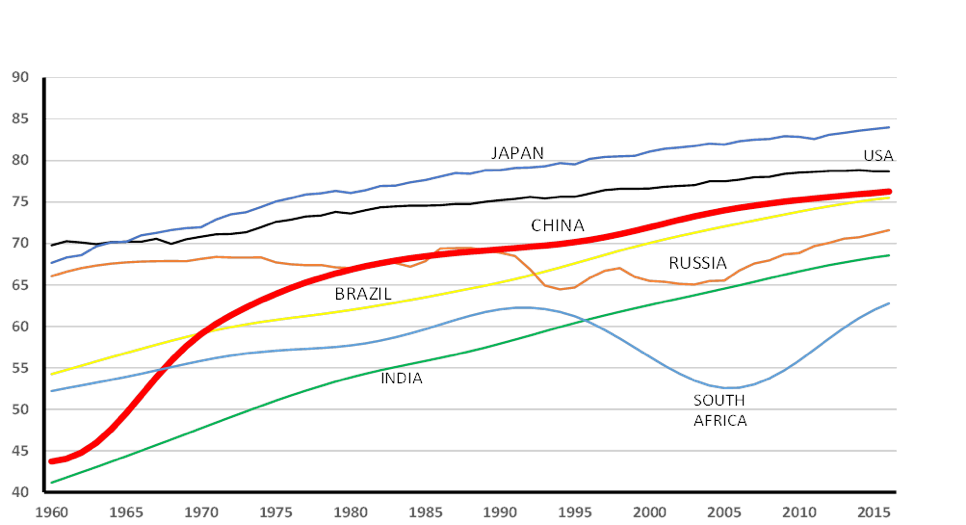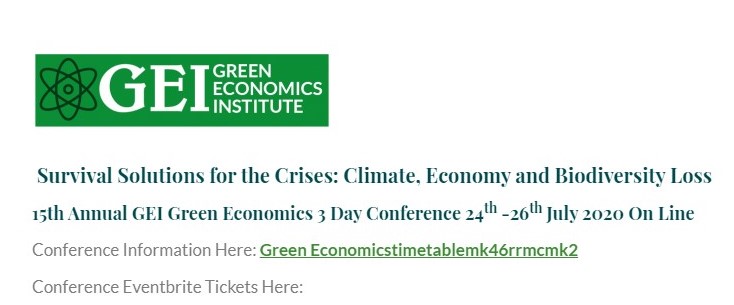Media briefings on EAEPE scholarship
In this section we present the work of EAEPE scholars. We periodically publish abstracts of recent publications or work in progress on hot topics or issues with strong policy relevance. This section is meant to direct media to our members and their publications and to show the plurality and richness of the scholarly work within EAEPE. Journalists can contact authors directly or via Andrea Bernardi, abernardi @ brookes.ac.uk.
For the time being, we are using this section to disseminate contributions on the COVID-19 Crisis
________________________________________________________________________________
March 15, 2021
Covid-19 - L’économie dévoilée par la crise pandémique
What does the covid-19 crisis reveal about Economics and the Economy?
Un an seulement après l’annonce de la découverte d’un nouveau virus dans la ville de Wuhan, en Chine, le monde n’est plus le même. Les transformations que la pandémie a provoquées et les réponses collectives qui y sont apportées (confinement des personnes, réduction drastique de la circulation des biens et plus largement de l’activité économique et sociale) auront des effets structurels. Toutefois, l’ampleur et la nature de ces effets sont difficiles à concevoir.
La Revue de la régulation a lancé un appel à contributions pour engager le débat au-delà de l’actualité immédiate et mettre en valeur les compétences des chercheuses et chercheurs qui s’inscrivent dans la filiation des travaux hétérodoxes et pluralistes en sciences économiques et sociales – des compétences trop peu visibles sous les feux de la rampe médiatique.
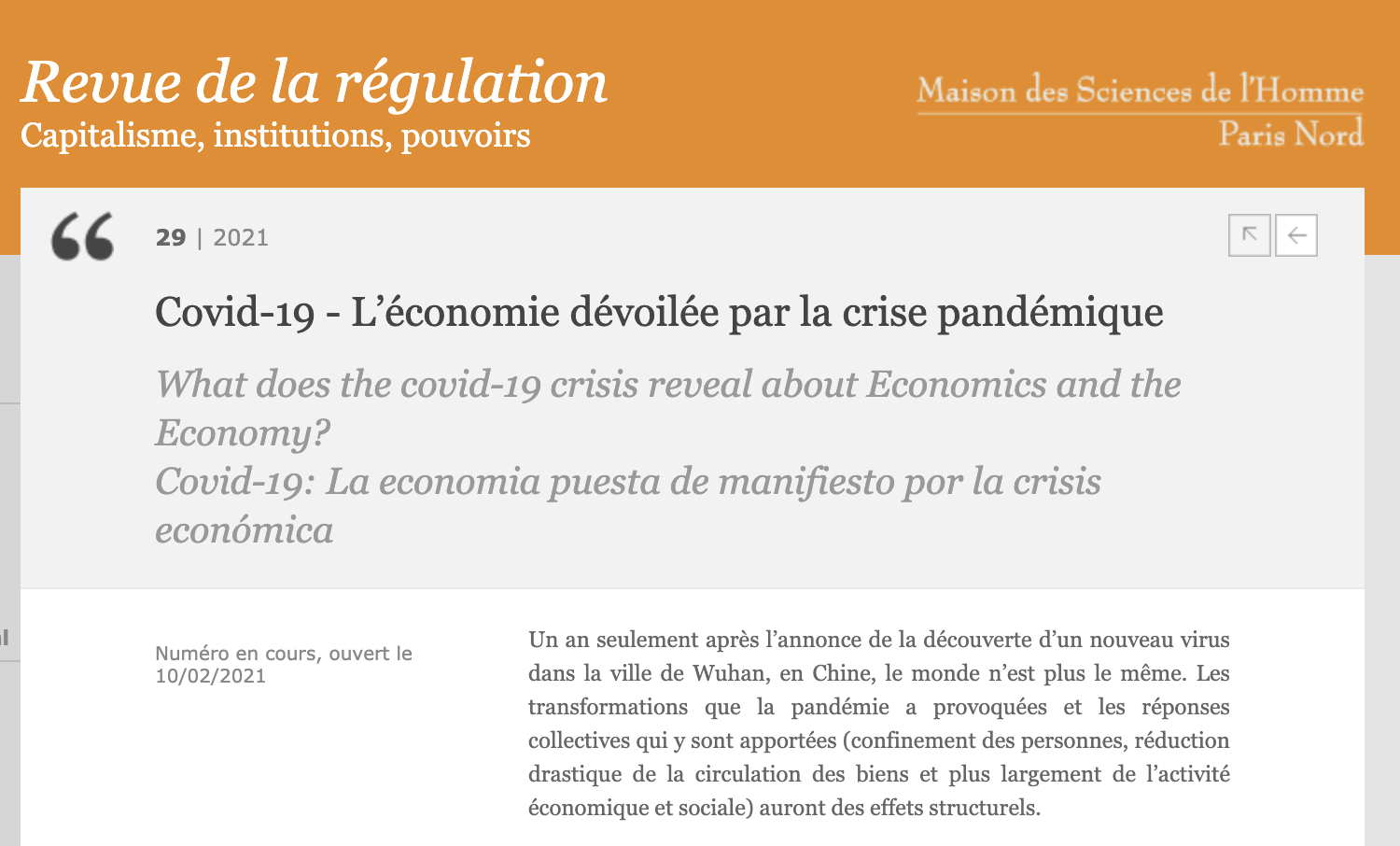
________________________________________________________________________________
October 23, 2020
Building back better - lessons and opportunities from the COVID-19 pandemic
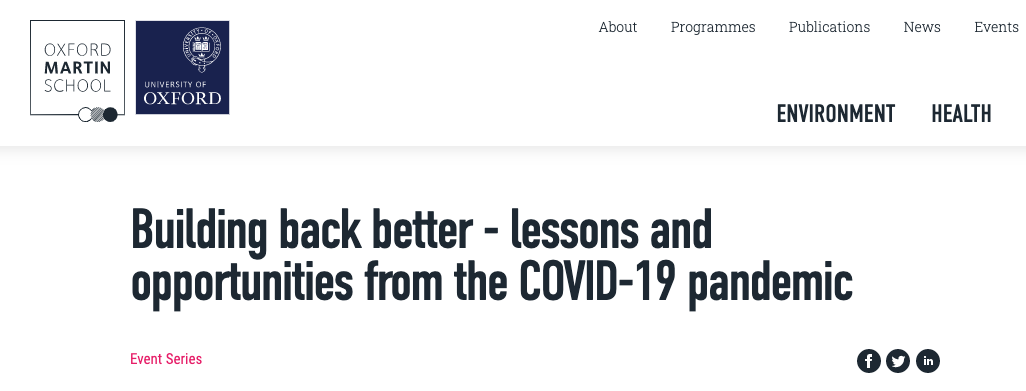
________________________________________________________________________________
July 9, 2020
Survival Solutions for the Crises
________________________________________________________________________________
June 7, 2020
Are we heading into another Depression? Financial Times
The Covid-19 lockdowns have led to the largest rises in unemployment since the 1930s. The Financial Times asked leading economists and market analysts what to expect and what might be done to avert turmoil.
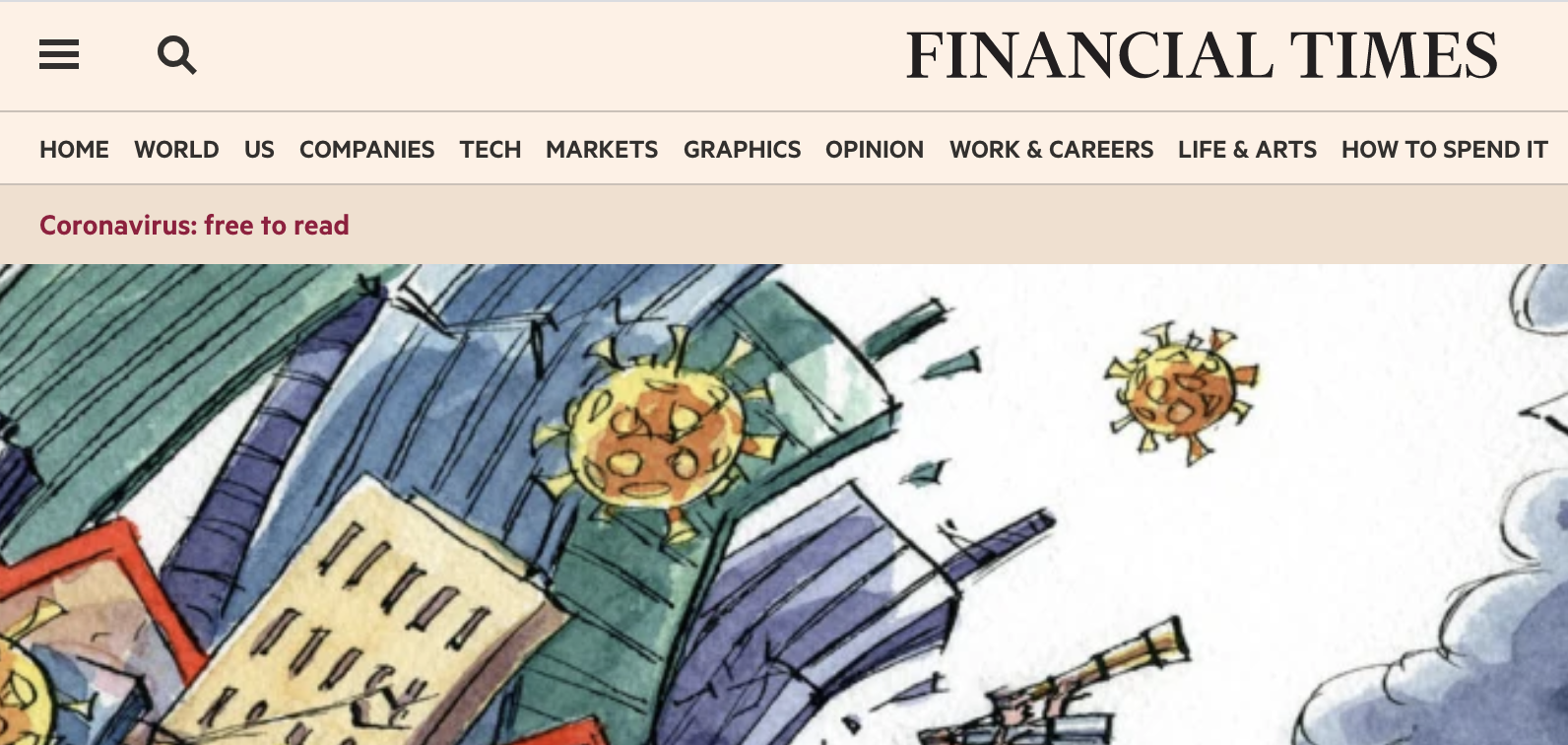
________________________________________________________________________________
June 2, 2020
Political Economy and Politics – Covid-19, Critical Political Economy, and the End of Neoliberalism?
Covid-19 threatens to bring an end to neoliberalism. Back in October 2019, when we drafted the call for papers for the ESA’s Critical Political Economy Research Network (CPERN) mid-term workshop – What’s Next? Critical Political Economy at the End of Neoliberalism? – we could not have known how close to the end of neoliberalism we would now seemingly find ourselves. The replacement of neoliberalism has gone from being an urgent matter for discussion, to a transformation that may already be upon us. In such a context, we need the insights of critical political economy more than ever. That means focusing on (and seeking to change) the power relations and inequalities associated with the current socio-economic model, going beyond the mere technical description of how those economies (dys)function.
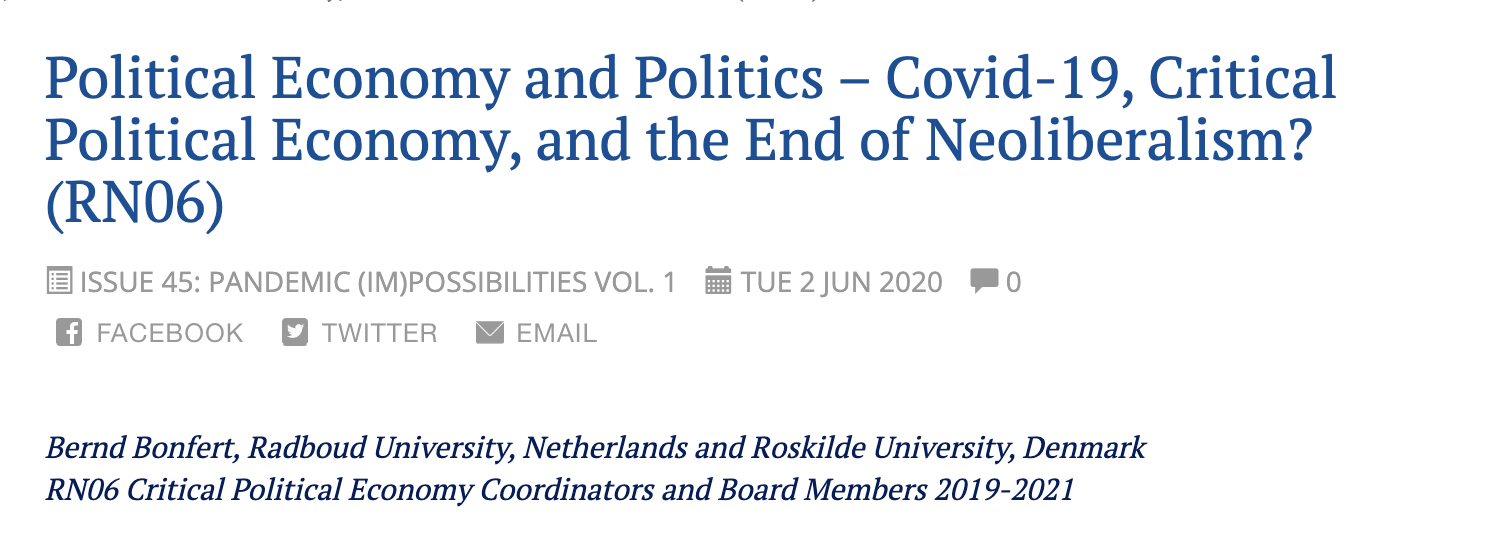
________________________________________________________________________________
May 18, 2020
COVID-19 pandemic will bankrupt more economies than it kills. China.org.cn
The current global medical crisis has sounded the death knell for conventional beliefs about the inability of oil resources to support the world economy. For several decades, many experts predicted a decline in oil production in line with ideas like Marion King Hubbert's (1956) peak oil theory. However, the coronavirus epidemic event upset this. Before the COVID-19 crisis, world consumption was around 100 million barrels of oil/day in total. In the period from April 2019 to April 2020, the drop in demand is estimated to have been around 29 million barrels/day.
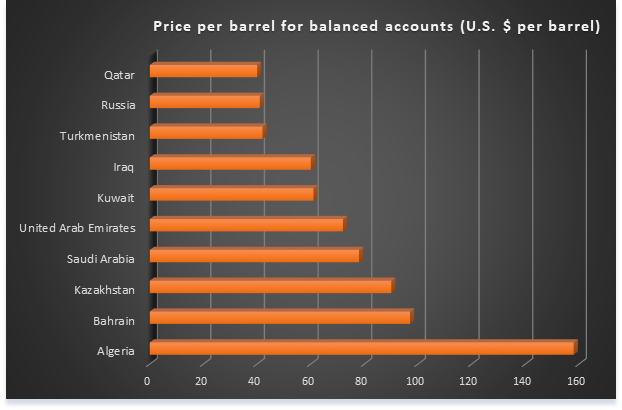
________________________________________________________________________________
May 14, 2020
Is the virus, not lockdowns, doing most of the economic damage? Alphaville
Our suspicion, though, is that it’s going to turn out that the lockdown dilemma is not quite as binary as is often made out. Regardless of how draconian government’s lockdowns are, we think the reason a large portion of people aren’t going out and spending not because of the lockdown, but because of the virus itself.
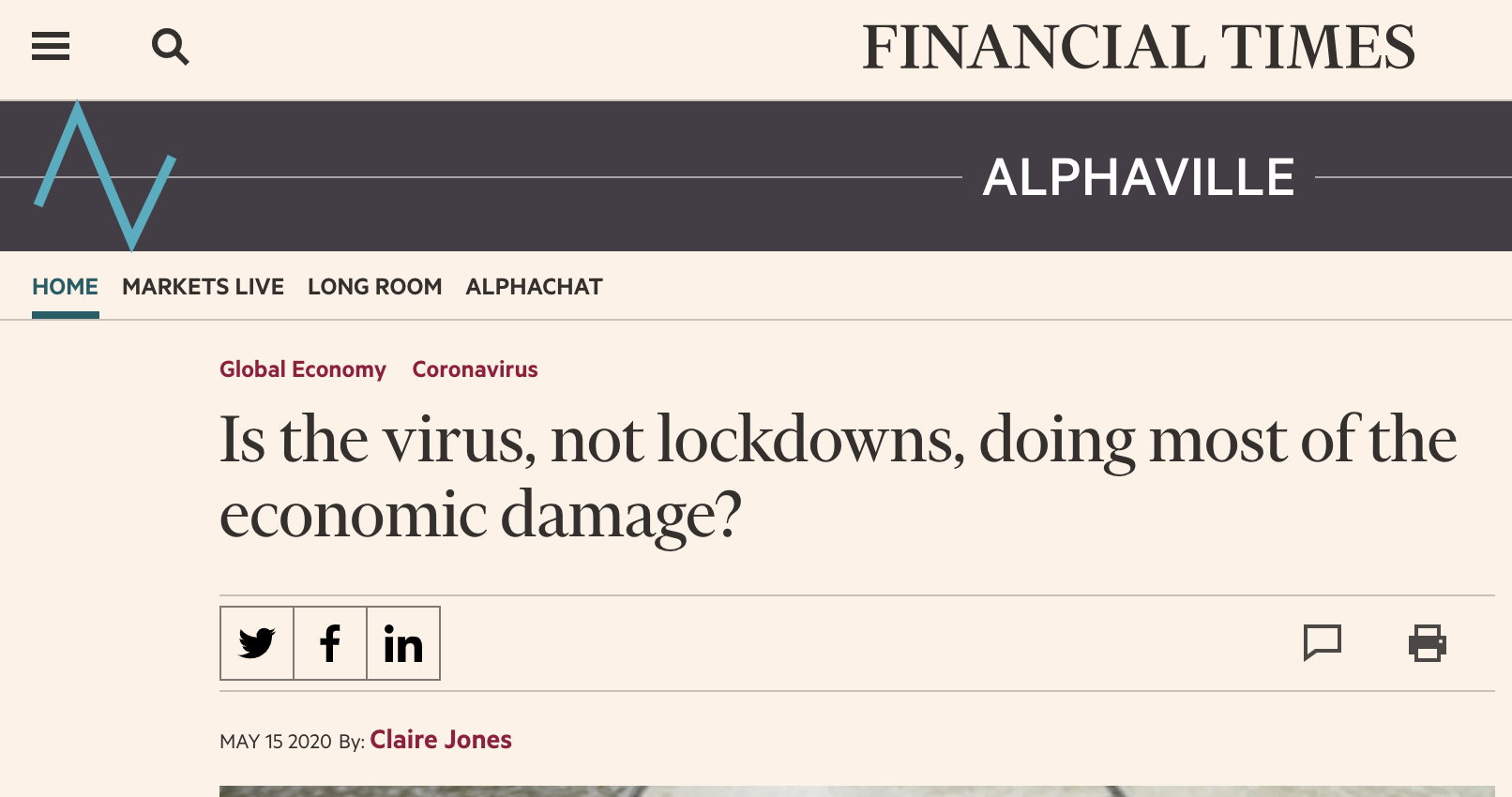
________________________________________________________________________________
May 12, 2020
How Pandemics Leave the Poor Even Farther Behind. IMF Blog
The COVID-19 crisis is now widely seen as the greatest economic calamity since the Great Depression. In January, the IMF expected global income to grow 3 percent; it is now forecast to fall 3 percent, much worse than during the Great Recession of 2008-09. Behind this dire statistic is an even grimmer possibility: if past pandemics are any guide, the toll on poorer and vulnerable segments of society will be several times worse. Indeed, a recent poll of top economists found that the vast majority felt the COVID-19 pandemic will worsen inequality, in part through its disproportionate impact on low-skilled workers.
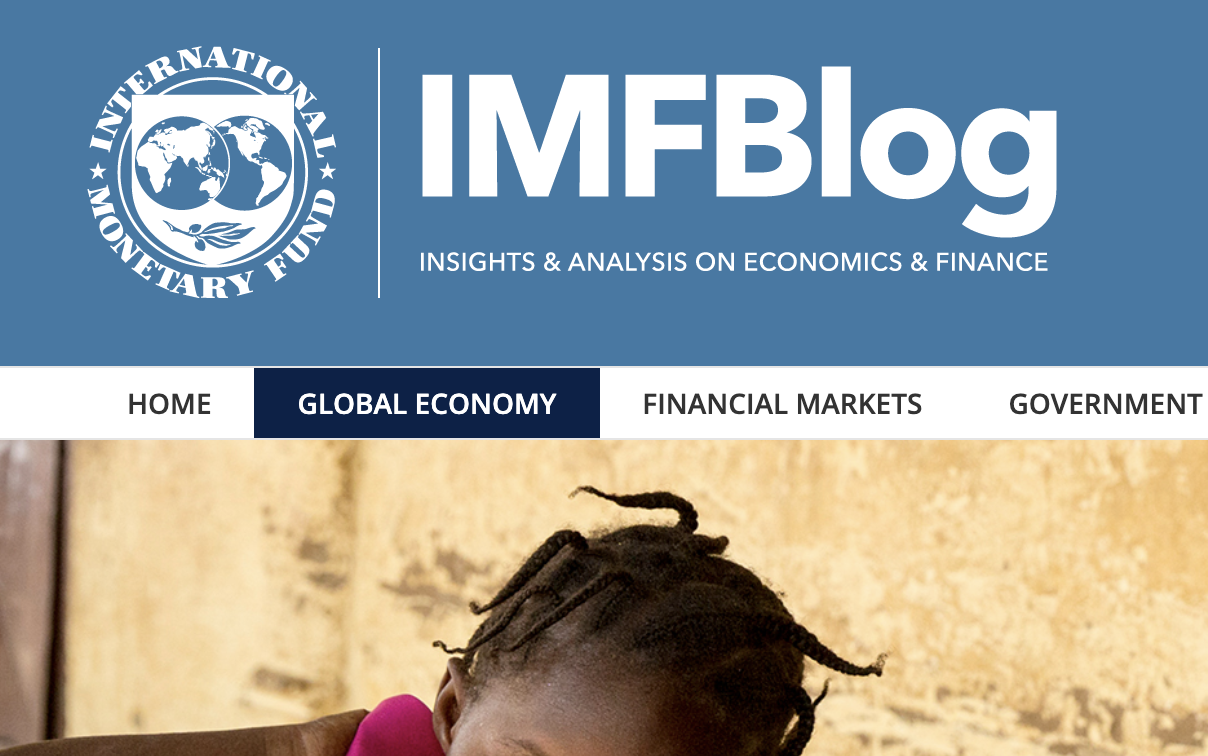
________________________________________________________________________________
May 10, 2020
Has covid-19 killed globalisation? The Economist
Even before the pandemic, globalisation was in trouble. The open system of trade that had dominated the world economy for decades had been damaged by the financial crash and the Sino-American trade war. Now it is reeling from its third body-blow in a dozen years as lockdowns have sealed borders and disrupted commerce
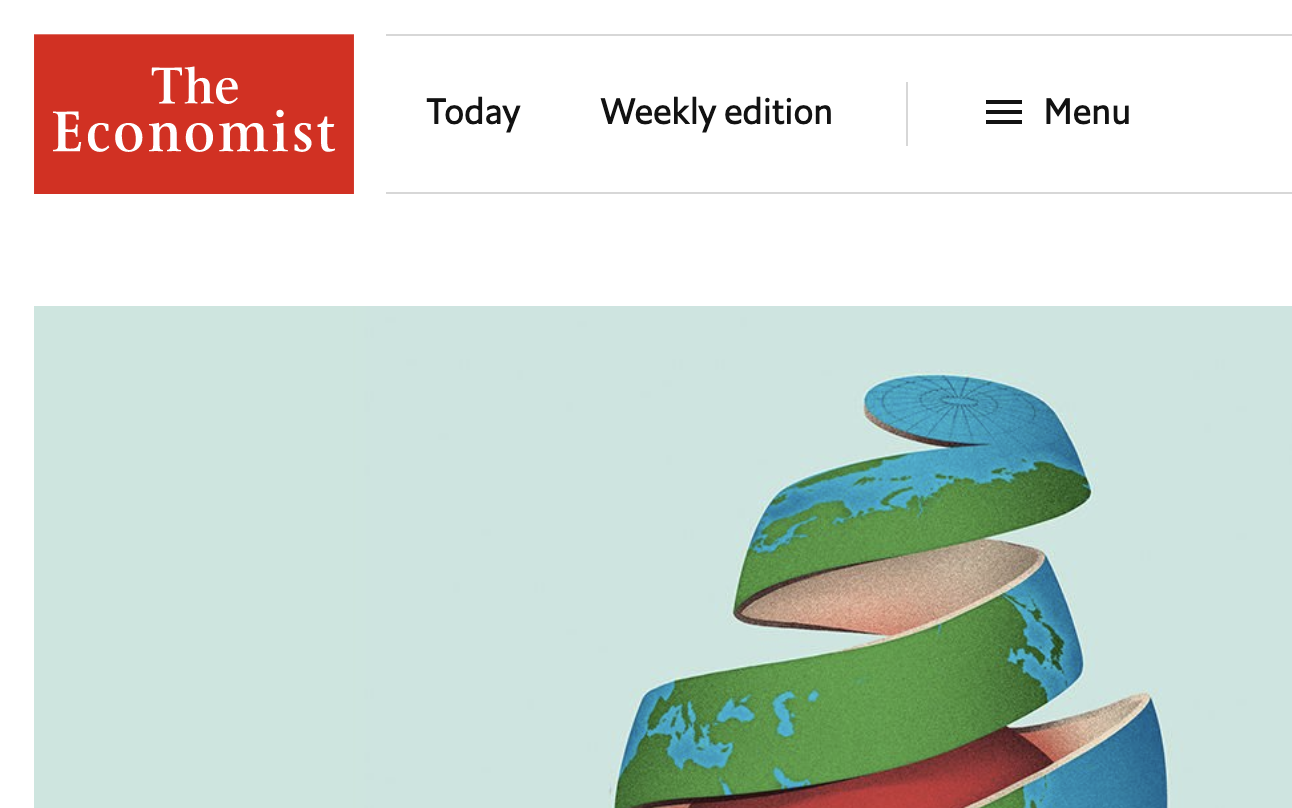
________________________________________________________________________________
May 5, 2020
Will the socio-ecological transition be the great forgotten aspect of the post-Covid recovery?
By Jean-Christophe Graz, Sylvain Maechler, Yannick Perticone, Jimena Sobrino Piazza (Université de Lausanne) and Michel Damian (Université Grenoble Alpes)
The Conversation France, 2 April 2020
At more than $2 trillion, the program adopted by the U.S. Congress in March 2020 is the largest aid package ever adopted by the United States since its independence. In the face of the unprecedented health measures taken to combat the Covid-19 pandemic, not a day goes by without a government or international organization announcing record contingency plans to help the economy. What kind of recovery are we going to see? What place will be given to the socio-ecological transition?
The article published in French aims at providing preliminary figures comparing the amounts announced by official bodies for financing the ecological transition to the arsenal of emergency economic measures taken to respond to the pandemic. It shows that the Covid-19 packages are 2 to more than 10 times higher than the range of 2.5% of annual GDP estimated to be needed for the ecological transition.
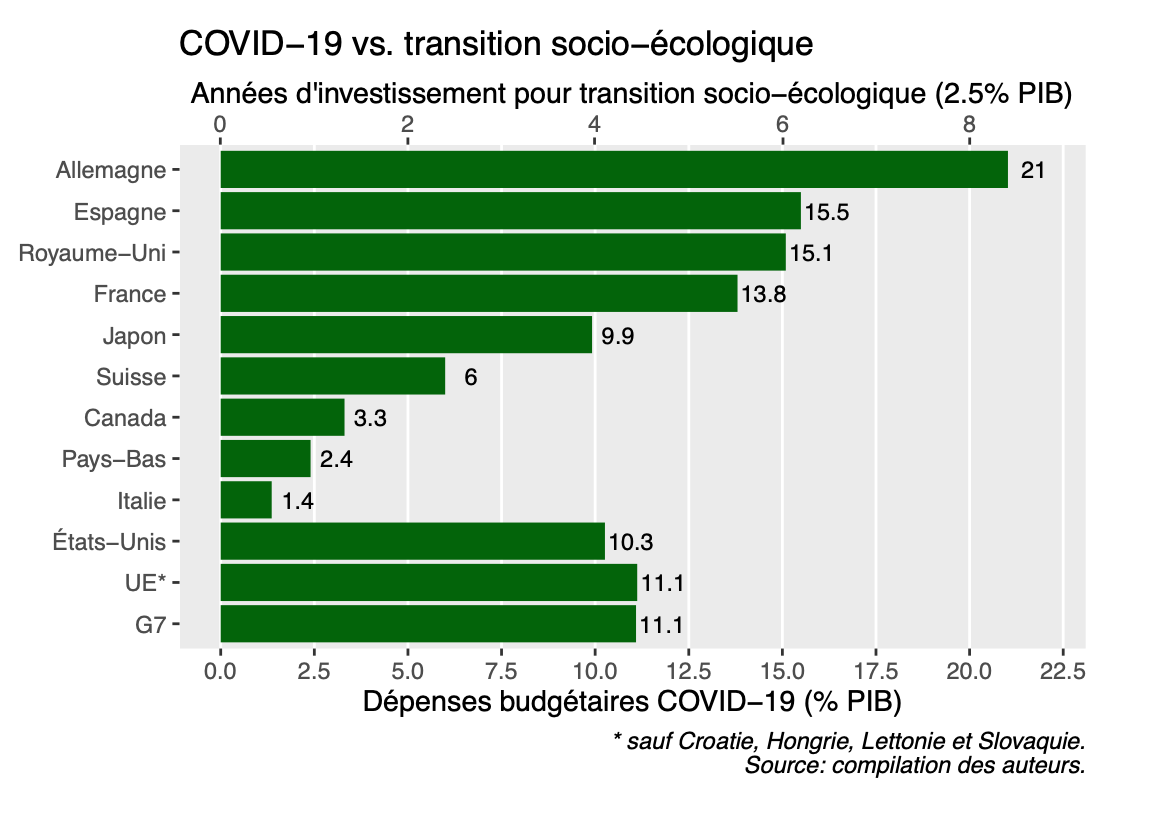
________________________________________________________________________________
May 4, 2020
What do economists have to say about the challenges of our time?
Webinar series exploring contemporary economic issues from a pluralist perspective | Every Thursday 3pm. The scale of the COVID-19 crisis and its economic impact is unprecedented. Yet even before the public health crisis struck, there were serious questions about the ecological, financial and social sustainability of our economy.
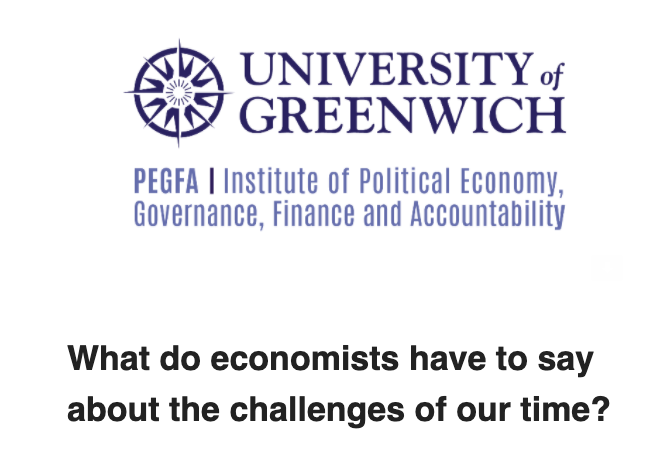
________________________________________________________________________________
April 29, 2020
Economics and Public Health: a case for interdisciplinary cohesion in the time of Coronavirus, Pritika Rao & Smita Srinivas
We are in unusual times that call for unusual opportunities to talk about complex issues. Economics’ application to health is one of them. The recent pandemic has brought home smartly to the world’s population that disease and response have important industrial elements.
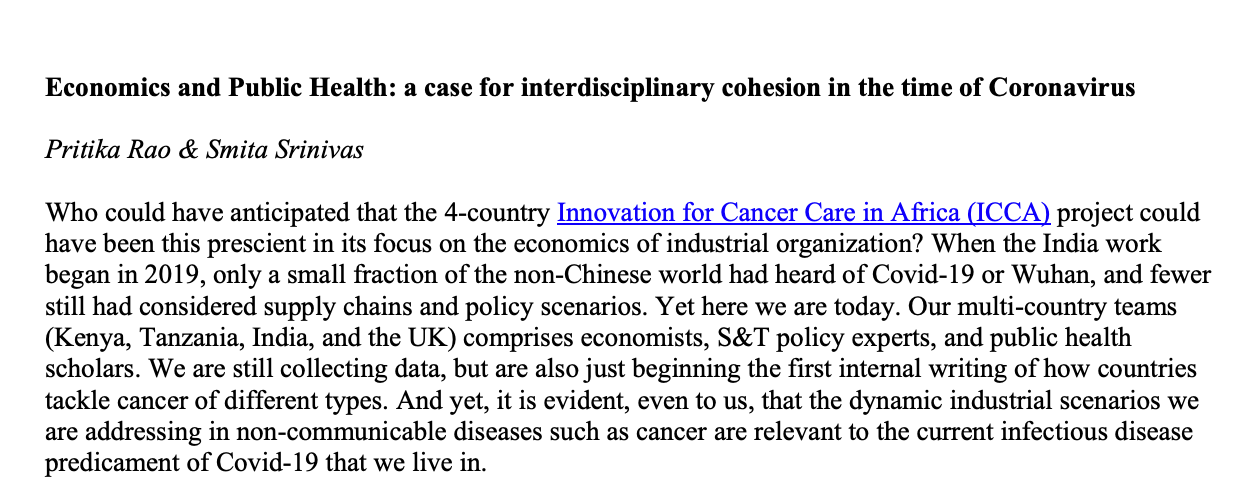
________________________________________________________________________________
April 28, 2020
Monetisation: Do not panic, Olivier Blanchard, Jean Pisani-Ferry
In response to the sanitary crisis, extraordinary operations are under way in most countries (Baldwin and Weder di Mauro 2020). Exceptionally large, often open-ended fiscal support programmes have been launched and they are being coupled with exceptionally large purchases of government bonds. In the UK, the Treasury and the Bank of England have just announced the temporary reactivation of a scheme that makes it possible for the central bank to finance public spending directly.
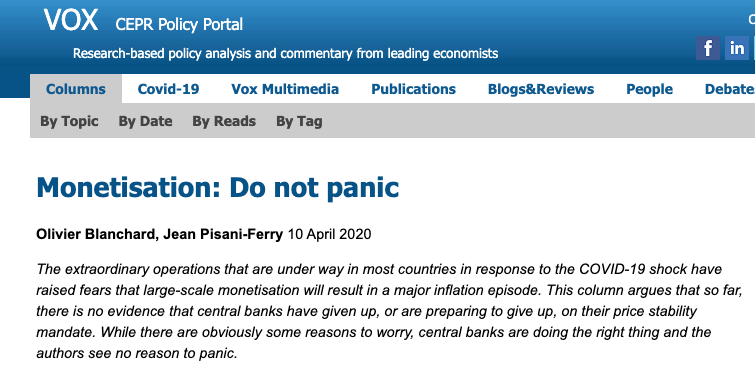
________________________________________________________________________________
April 27, 2020
American inequality meets covid-19, The Economist
The covid-19 epidemic in America is two-pronged—a contagious sickness first, followed by an economic malaise. Despite a big stimulus programme from Congress, including the temporary introduction of something like a universal basic income that ought to benefit the poorest disproportionately, it is the least advantaged who are suffering most.
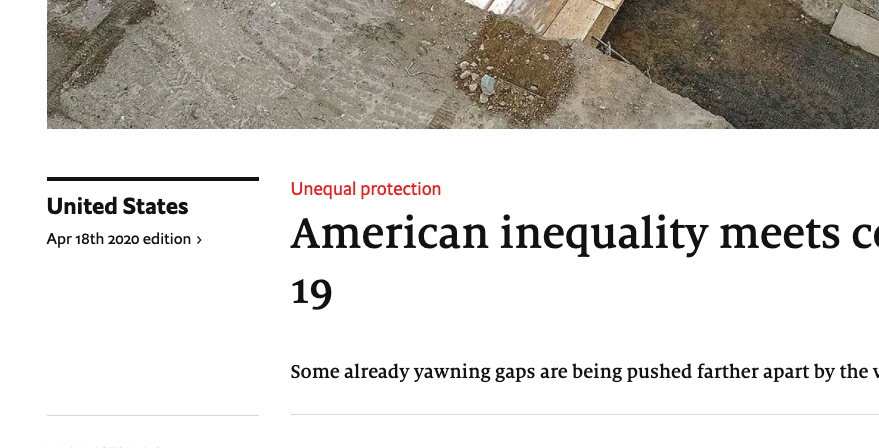
________________________________________________________________________________
April 20, 2020
Covid-19 could lead to the return of inflation—eventually, The Economist
Inflation in the rich world resembles a fairy-tale beast. Older members of society frighten younger ones with stories of the creature’s foul deeds, but few serious people expect to see one and some doubt it ever existed. Although high inflation seemed a fixture of the economic landscape in the 1970s, changes to policy and the structure of the global economy since have ushered in four decades of ever meeker growth in prices. As covid-19 shutters businesses and leaves supermarket shelves bare, some economists fret that the pandemic could lead to inflation making an unwelcome return.
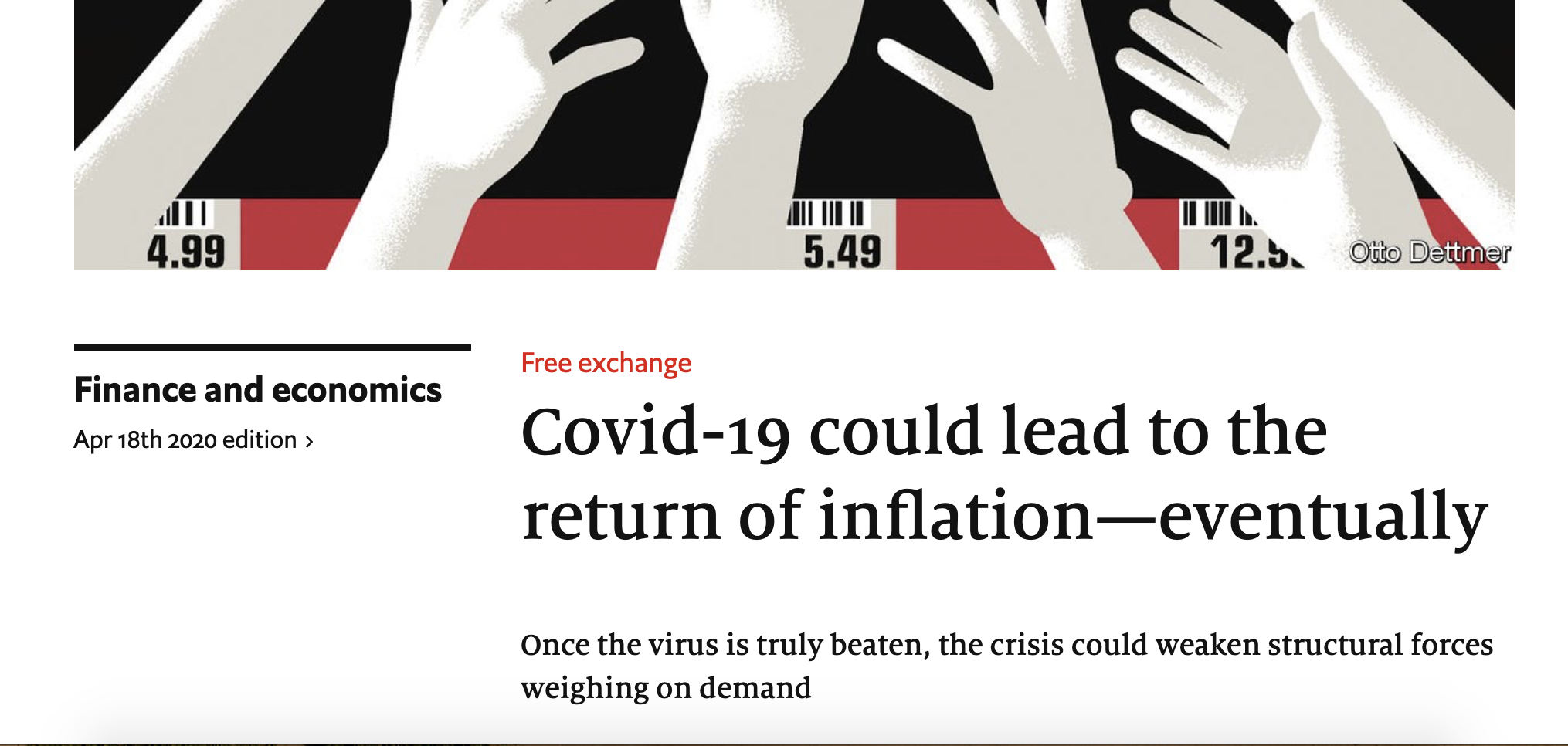
________________________________________________________________________________
April 17, 2020
COVID-19 resources from Oxford Martin School

________________________________________________________________________________
April 17, 2020
COVID-19: Insights from Innovation Economists
The present document provides the take of innovation economists on the current pandemic. It is addressed to the general public and focuses on questions related to the Science, Technology, and Innovation (STI) ecosystem. It does not present new research findings. Instead, it provides a reading of current real-world developments using economic reasoning and relying on existing economic research.
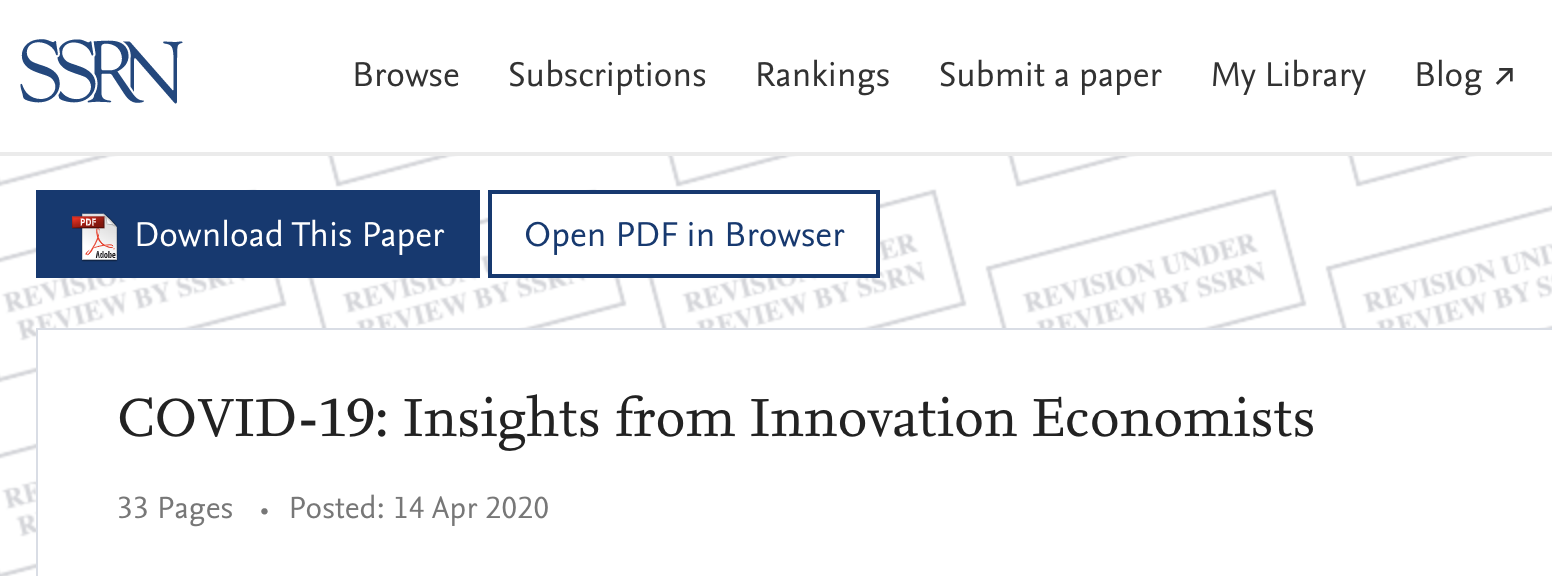
________________________________________________________________________________
April 16, 2020
The Quarantine Files: Thinkers in Self-Isolation
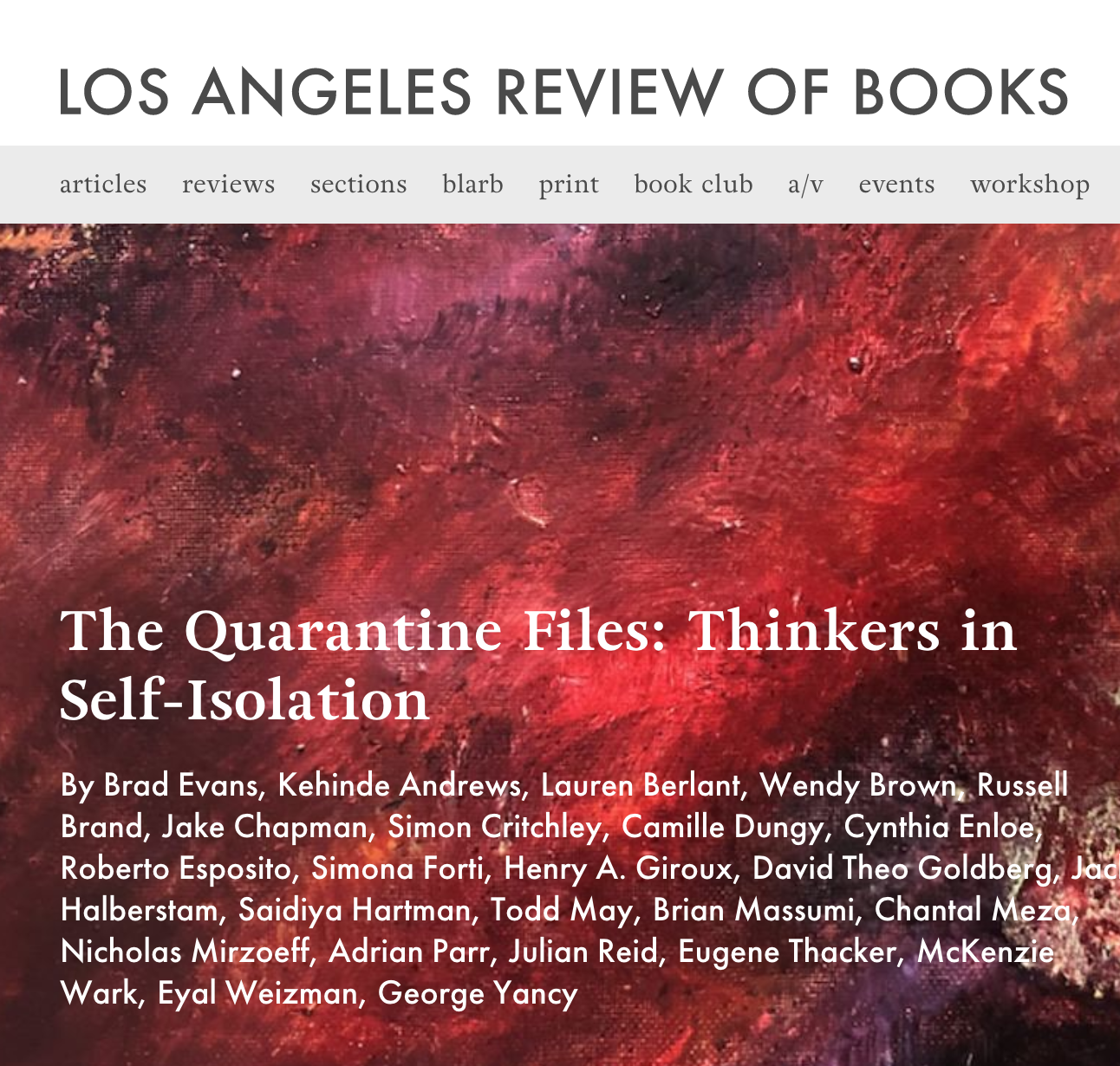
________________________________________________________________________________
April 15, 2020
COVID, remobilisation and the ‘stringency possibility corridor’: Creating wealth while protecting health
Richard Baldwin
The world is at war with COVID-19; containment policies are a key weapon. But this in not ‘total war’ where trade-offs can be waved off; governments must perform balancing acts. This column argues that instead of thinking of containment stringency as balancing dollars versus deaths, we should think of it as a balancing infections versus tolerability. Containment policies must stay in the ‘corridor’ where they are stringent enough to avoid overwhelming hospitals, but lax enough to avoid overwhelming citizens’ tolerance levels. Solving the dilemma will require an increase in production and a relaxation of constraints – in short, it will involve a partial remobilisation of the workforce. The mission-critical task facing us is to develop a strategy for remobilising workers without risking a medical overload.
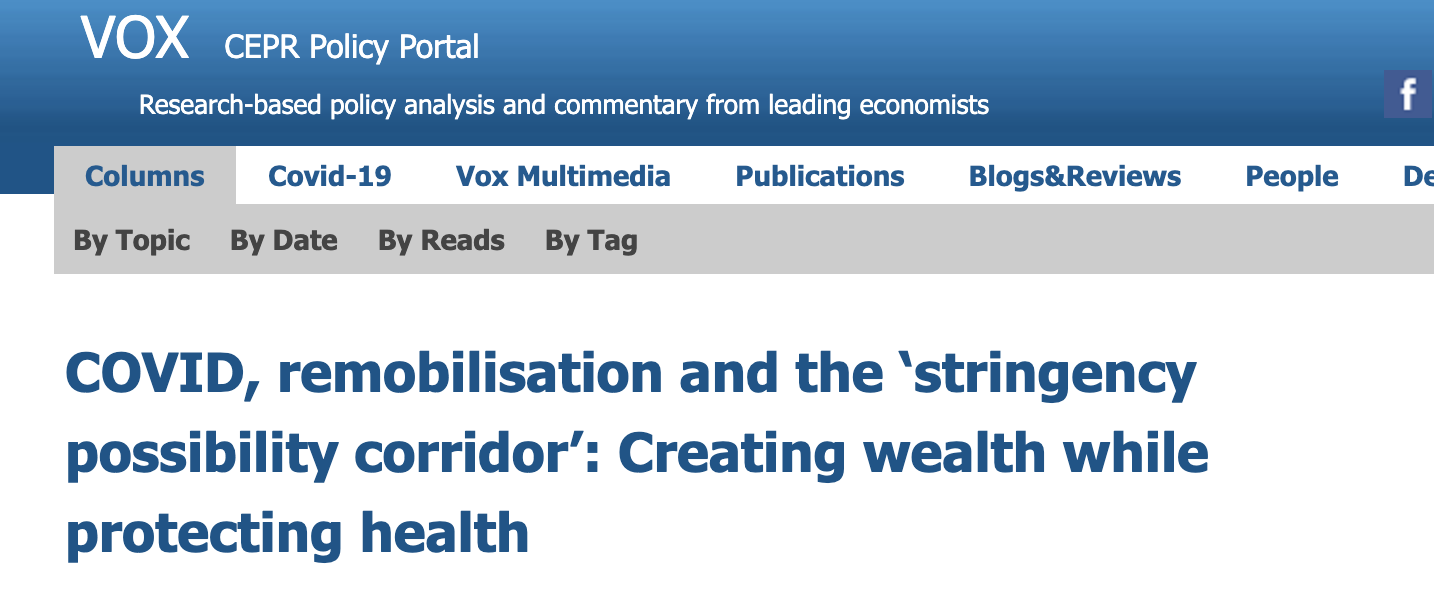
________________________________________________________________________________
April 14, 2020
Covid-19 and the coming Euro crisis
Engelbert Stockhammer
The corona virus crisis will have a major economic impact. Current data suggest output losses in the order of magnitude as in the financial crisis 2008/09. Unlike the global financial crisis the corona crisis represents a supply-side shock; like 2008/09 governments have stepped in on a massive scale. While the global financial crisis emanated from the USA, its worse effects were felt in southern Europe a few years later: the Euro area experienced a sovereign debt crisis, austerity in the worst affected countries and a weak economic performance ever since. This commentary argues that unless the Euro zone changes its economic policy a similar sovereign debt crisis is likely consequence of the corona crisis.
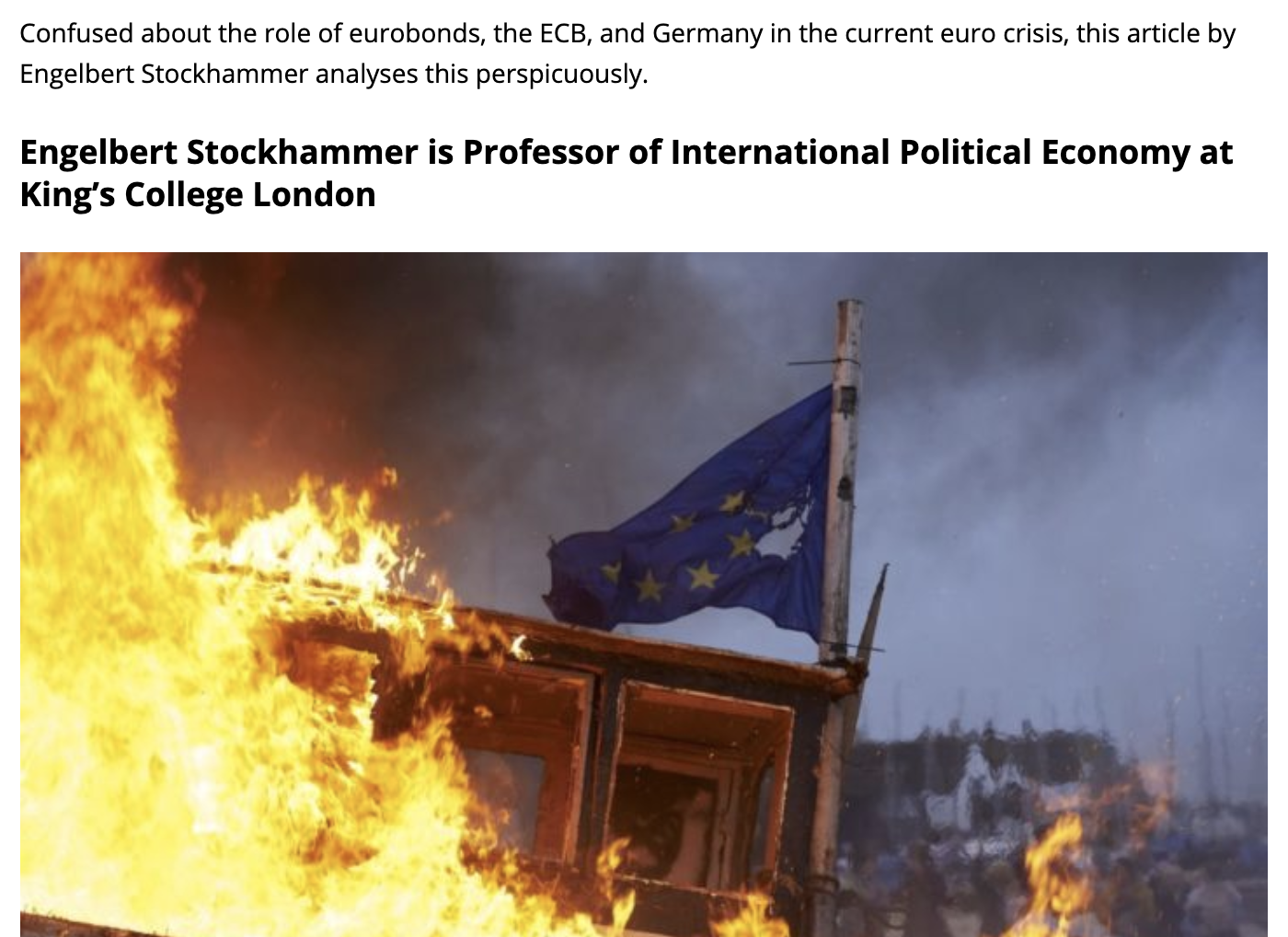
________________________________________________________________________________
April 10, 2020
‘We need Renaissance bonds to face the health and economic crisis’
In this open letter to EU heads and national leaders, over 1,500 economists, academics, and professionals from all over Europe propose a series of urgent measures in response to the Covid-19 epidemic. They also demand that the EU create a common fund that would issue European securities called "European Renaissance Bonds" to help EU countries overcome the crisis.
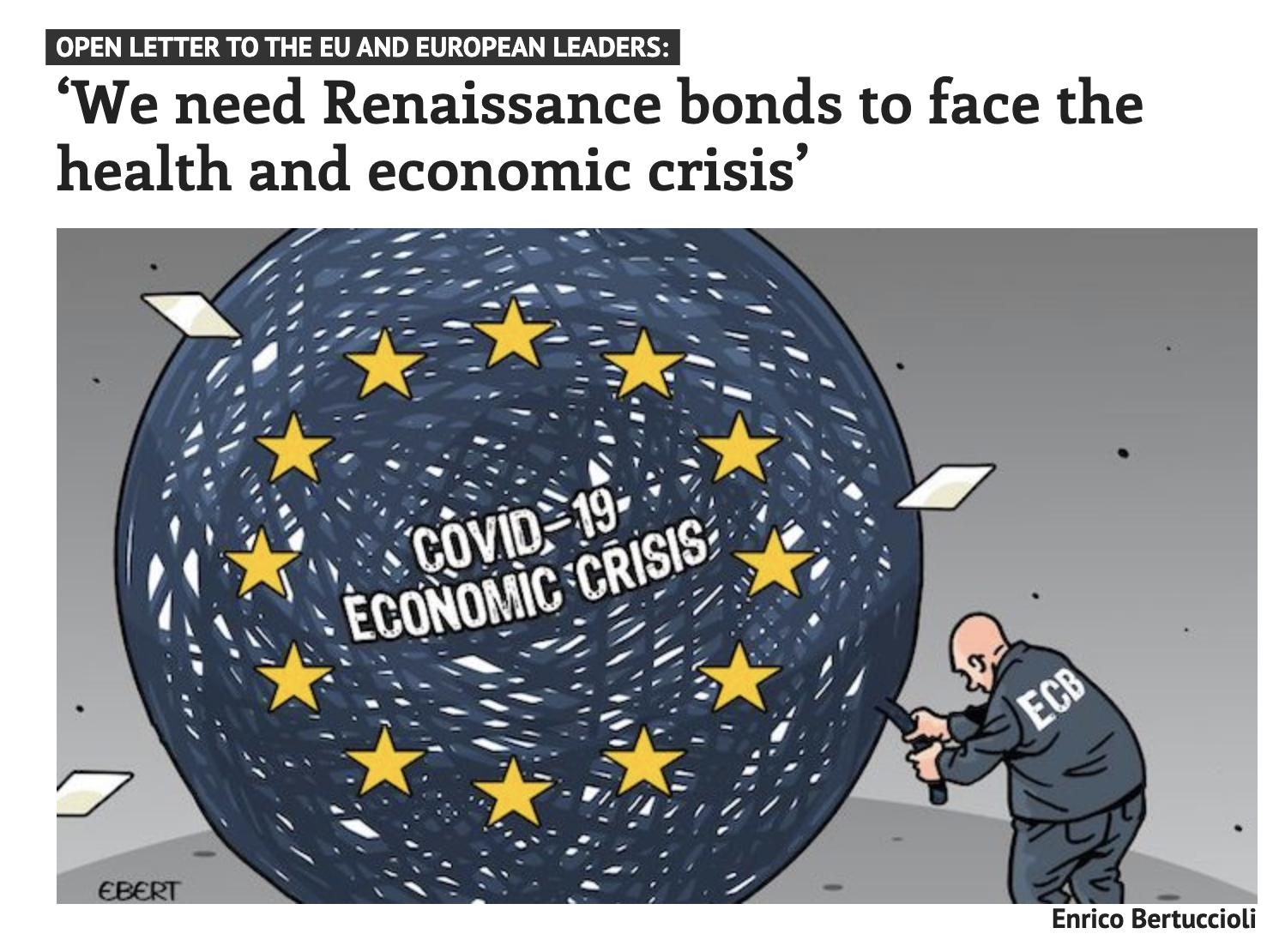
________________________________________________________________________________
April 9, 2020
L'impatto di breve periodo del Covid-19 sulla ricerca di lavoro
Francesco D’Amuri e Eliana Viviano (Banca d’Italia)
L’articolo analizza gli effetti dell'attuale epidemia di Covid-19 sull'offerta di lavoro, concentrandosi sull'Italia,
il primo paese occidentale ad essere gravemente colpito. Si rileva un calo senza precedenti della ricerca di
lavoro a seguito dell'epidemia utilizzando come indicatore l'intensità della ricerca di lavoro su Internet ad alta
frequenza. La conferma di tale tendenza nei prossimi mesi darebbe un contributo negativo alla variazione del
tasso di disoccupazione, mitigandone l’aumento in presenza di un probabile calo marcato dei livelli di
occupazione.
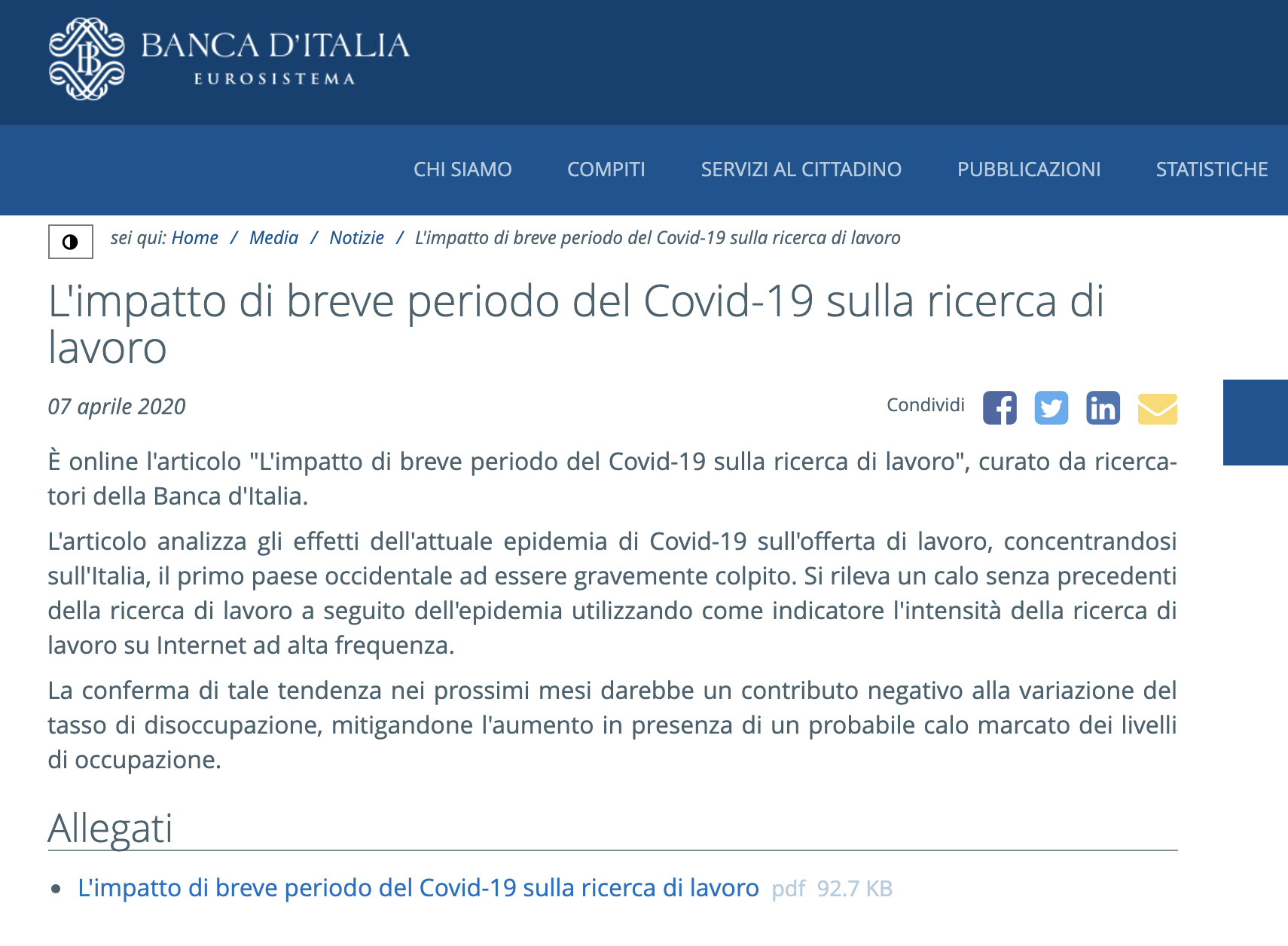
________________________________________________________________________________
April 9, 2020
ECB dissenters resisted Christine Lagarde’s ‘no limits’ virus response
Christine Lagarde faced “reservations” from a vocal minority of the European Central Bank’s governing council members over her call as ECB president for a “no limits” policy to shield the eurozone from the coronavirus pandemic at its emergency meeting last month.
These dissenting views were referred to in the latest account of the ECB council’s conference call on March 18, when it decided to buy €750bn more bonds in a significant expansion of its asset-purchase programme to address “severe strains” in financial markets.
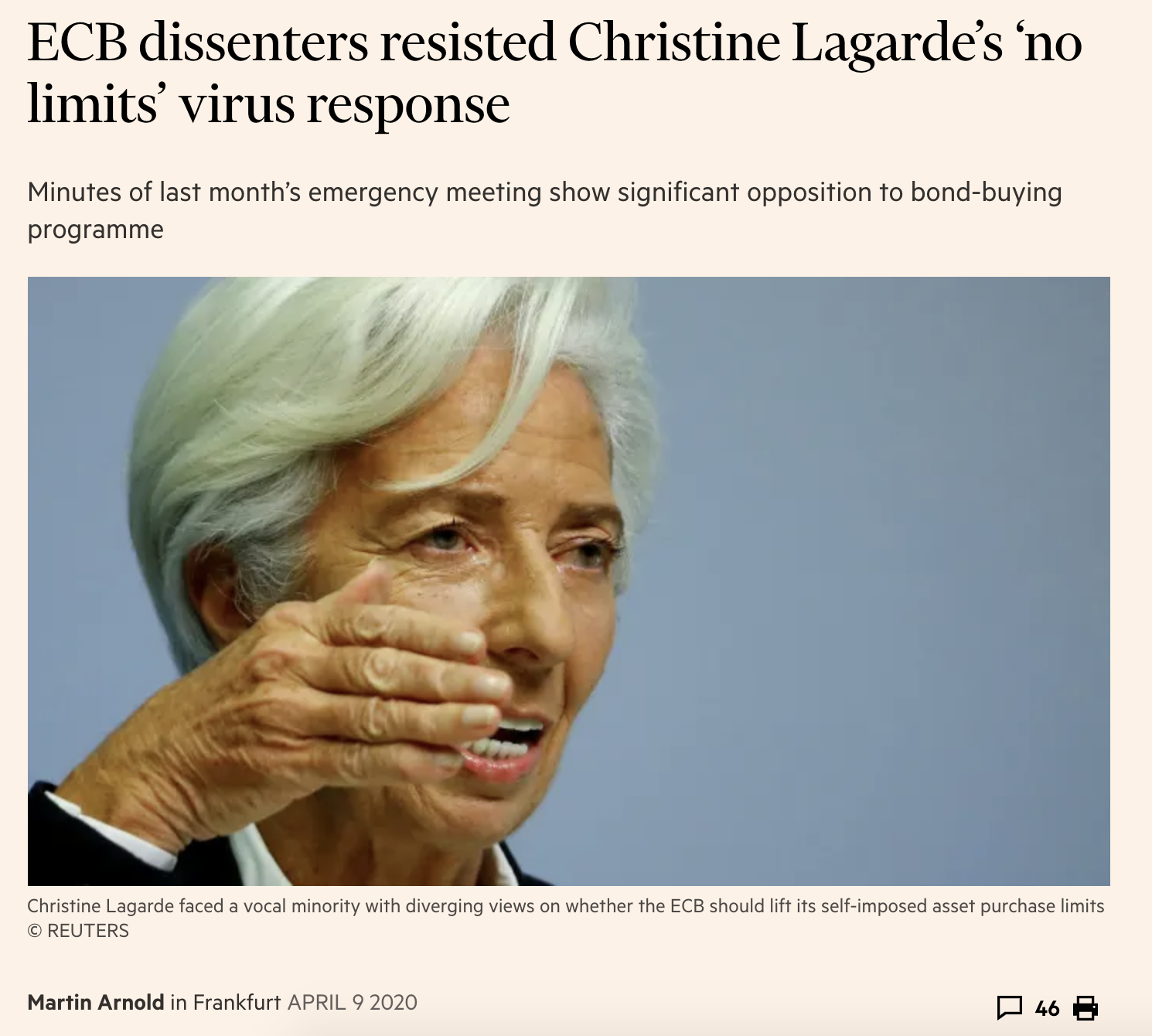
________________________________________________________________________________
April 1, 2020
Economic Policies for the COVID-19 War
The COVID-19 pandemic is a crisis like no other. It feels like a war, and in many ways it is. People are dying. Medical professionals are on the front lines. Those in essential services, food distribution, delivery, and public utilities work overtime to support the effort. And then there are the hidden soldiers: those who fight the epidemic confined in their homes, unable to fully contribute to production.
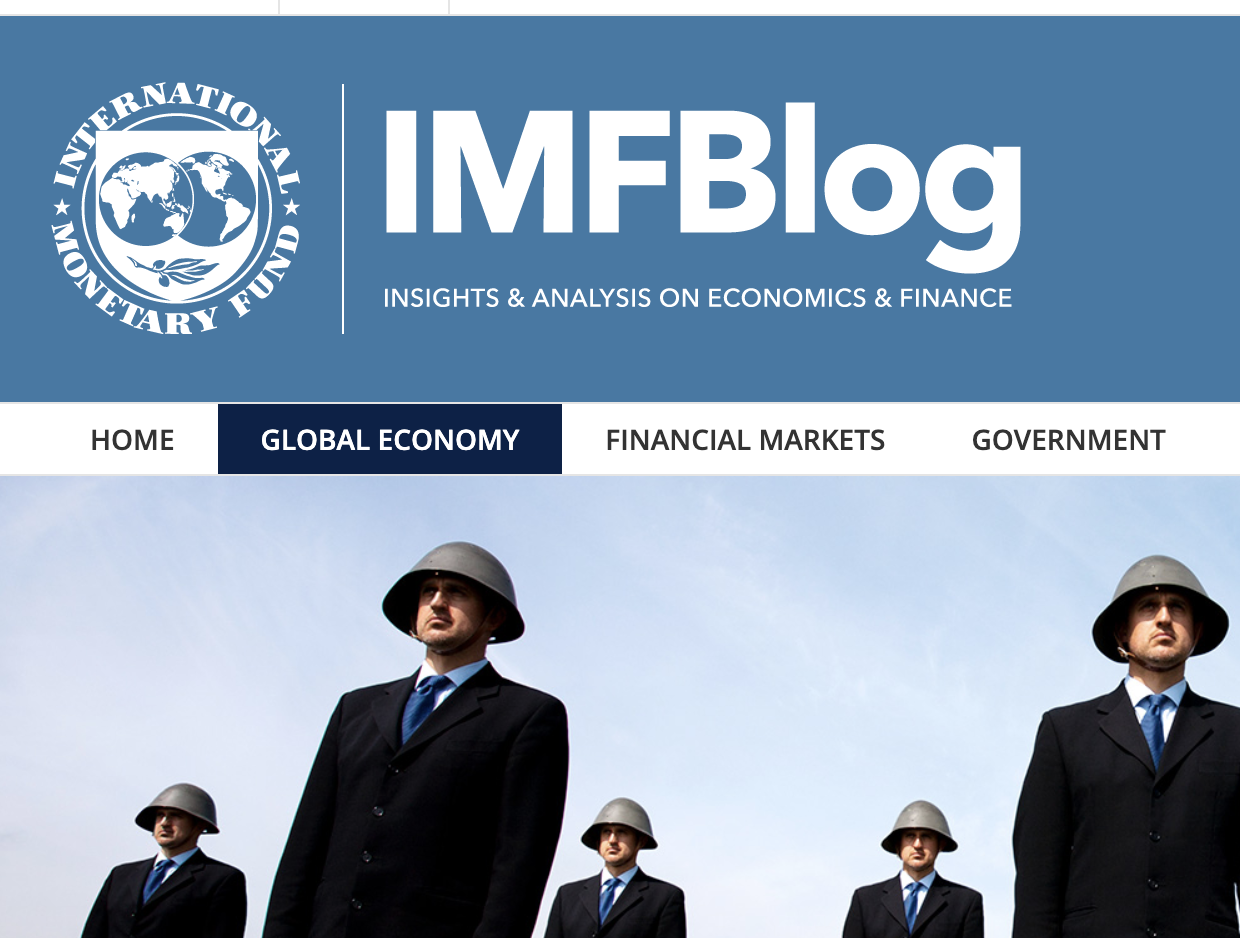
________________________________________________________________________________
March 30, 2020
'Whatever it takes' Getting into the specifics of fiscal policy to fight COVID-19
Olivier Blanchard (PIIE)
The motto for fiscal policy these days is: “Whatever it takes,” and it is indeed the right motto. But what does it mean? What about the specifics? And can we really afford it? Or will we wake up in a few months with a hangover, asking ourselves, “What on earth did we do?”. The purpose of this blog is to take a pass at these issues and come to a tentative conclusion. (Spoiler alert: For advanced economies, “whatever it takes” may be less than you think. And, yes, we can almost surely afford it.) In a forthcoming blog, I shall compare my normative conclusions with what is being put in place in various countries.
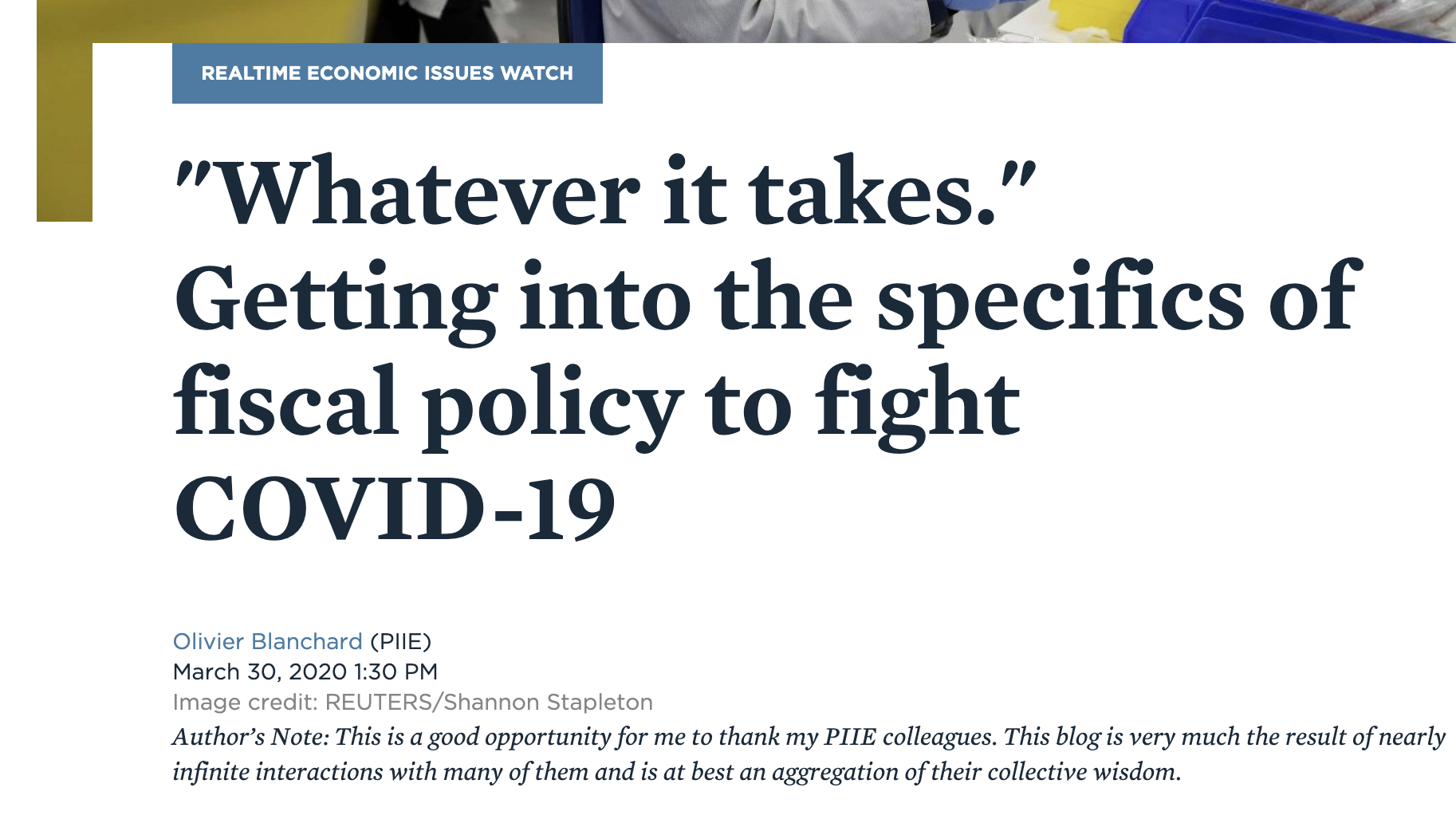
________________________________________________________________________________
June 15, 2019
China as a heterodox model in Healthcare: The New Rural Co-operative Medical Scheme
Andrea Bernardi (Oxford Brookes University) and Donni Wang (Shanghai University)
The analysis and discussions on Chinese economic growth are overwhelming, and it is equally so for Beijing’s directives and policies which directly impact western countries. However, the effectiveness of Chinese healthcare policies has been less extensively discussed. In fact, the topic was often dismissed by the assumption that economic growth came at a huge human cost and rested on very poor living conditions of the Chinese people. This is a gross inaccuracy because the healthcare improvements, since the 80s, matched the economic achievements. Building on a previous publication by Bernardi and Greenwood (2014), in this conference paper we describe the origin and the present situation of China’s health insurance together with its rural healthcare system. Considered to be unique and successful, they represent a heterodox model operating within the Chinese variety of capitalism. We describe how the political ideology of the Cultural Revolution under Mao greatly influenced health policy. Today’s system is shaped by a political economy mission and an identity rationale associated with the Traditional Chinese Medicine provision. We argue that an interplay between policy formation and the construction of national identity is present in both China and western democracies. Examples of this are the debates about the Obama Care reform in the USA and the NHS as a part of the Brexit Leave campaign in the UK. Yet in those cases, we argue that the mobilization of national identity can negatively affect the design of the best possible healthcare policies. On the other hand, given that the Chinese model appears efficient and effective, its current form and its predecessor, that of the barefoot doctors, should be taken as examples of a non-market based, socially optimal alternative for other nations.
Figure 1. Evolution of life expectancy in selected countries, from 1960 to 2015, source: Authors based on WHO data.
